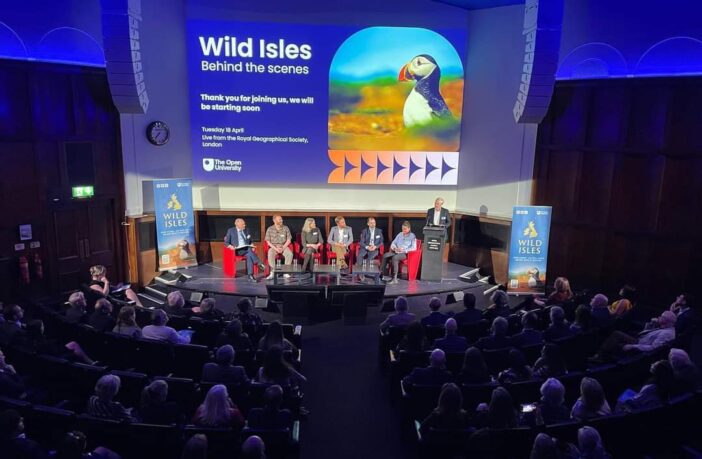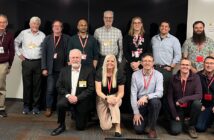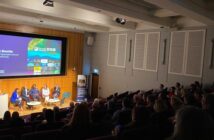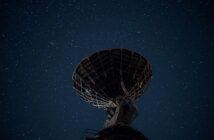Wild Isles: Behind the Scenes was the first large scale hybrid OU/BBC co-pro event hosted by the OU. It took all the collective expertise of the Faculty of STEM, Development Office and Broadcast and Partnership to make it such a resounding success.
The Ondaatje Lecture Theatre at the Royal Geographical Society was the stage for the Wild Isles Behind the Scenes event. It was the perfect setting to hear about the research and production of one of the most significant natural history documentaries to focus on the British Isles ever created.
The lecture theatre felt historic and learned. The wood panelled walls displayed the names of renown geographers through the ages. The rows of highly tailored, soft black leather seats were filled with more than 120 guests of influential in the world of sustainability, supporters of the OU and OU staff. In addition, there were approximately 500 staff, students and alumni watching online.
The event was Chaired by Professor Kevin Shakesheff, Pro-Vice Chancellor Research and Innovation at the OU. On the panel of five experts were STEM Faculty academic consultants Dr Miranda Dyson and Dr Phillip Wheeler, Head of Specialist Factual Commissioning at the BBC Jack Bootle and Chris Howard, Director and Producer, and Hilary Jeffkins Series Producer at Silverback Films.
The panel discussion covered the commissioning of such a revolutionary series, the role of the academic consultants, the use of pioneering technology and the impact that a series of this magnitude could have on society. It was followed by a lively Q&A session with lots of questions from the room and online.
“I hope one of the things the millions of people who watched the series takes on board is to bring back a sense, that nature in Britain, is part of our shared cultural heritage. We need to bring nature back into everyday lives.”
Commented Dr Phillip Wheeler, OU academic consultant on the series, about the impact of the Wild Isles series.
A wake-up call about wildlife depletion
Professor Tim Blackman, Vice-Chancellor of The Open University, opened proceedings. He recalled his childhood memories of engaging with nature where stag beetles and hedgehogs used to be abundant in his garden. Now he takes his five-year-old grandson bug hunting and is shocked by the stark scarcity of such a breadth of wildlife. This was his real-life wake-up call to what a massive depletion of wildlife we are seeing in a generation.
Resisting the draw to film familiar animal behaviour
Jack Bootle set the scene talking about resisting the need to return to classic and well-known habitats and risk circling the same events that audiences were very familiar. He said the concepts of Wild Isles was a light bulb moment. It gave the BBC the opportunity to tell some amazing, and new, wildlife stories.
The role of OU academic consultants
The conversation turned to Phil and the role of OU academics in the production process. He recalled how, in 2018/19, both he and Mandy were approached and met with the production team. They were invited to input and made suggestions about what to film, where to film and who to contact based in their academic expertise. He paid tribute to the knowledge and skills of the production crew as the incredible imagery could only have been captured by people who know what they’re looking for.
“As academics it was a real privilege to see the animal behaviour and ecosystems that they research so beautifully presented on screen.”
Having such a close working relationship with the team at Silverback Films meant that Phil and Mandy were able to ask for any supplementary footage that could be used exclusively for OU students in module material. Giving OU student unprecedented access to some of the most advance footage of animal behaviours and habitats.
Pioneering technology
Then it was the turn of the production team to share their insight and experience. Hilary and Chris, the series producer and director, respectively, explained that when they made a promise to Jack about how Wild Isles would be different, how they would capture detailed animal behaviour, they knew they were setting the bar very high.
The equipment and shot sequences would have to be revolutionary in order to capture new and unseen behaviour. The research came first (what and where), then the styling of the shot sequences and them the team turned their attention to what technology can they use to get those shots.
The ingenuity and innovative thinking of the filmmakers was truly tested. They had to designed and developed methods to allow them to film incredible intricate footage, like the tiny Masonry Bee building a nest in a shell.
There was also deeper conversations about how they could visualise some of this incredible animal behaviour. This is demonstrated in the Fresh Water episode and the Starlings after dark.
They were using classic filming techniques to get the normal footage of the Starlings flocking to roost. But while they were on location they wanted to explore how to go ‘deeper’ into the environment. How to make the viewing experience more immersive – the sound and the emotion.
When the team were packing up after the days filming, they would hear deafening ‘whooshing’ sounds as thousands of birds took flight as night fell. They knew something was happened to cause the Starlings to act in this way but needed to find out exactly what. They enlisted military grade night vision cameras to film and document this behaviour and were amazed at the insight they gained.
They saw rats scuttling through the tree branches, the Starlings jostling between themselves for the best positions, and then they saw it. A majestic barn owl hovering over the roost, taking its time to pick off its prey as the Starlings scattered trying to evade this unseen danger. The use of this technology had revealed this behaviour for the first time in nature documentary making.
Dr Phillip Wheeler concluded with a very poignant statement about the serious harm targeted exploitation is having on wildlife.
“We all reply on the exploitation of nature, but we must learn to do it ways that don’t destroy it. Science can help identify these sustainable paths. My hope is that Wild Isles will help everyone realised their personal impact on wildlife. The impact is the missing heritage and how if we continue it will be stolen from the future generations.”
For the interactive Wild Isles map and to learn more about the issues covered in the series visit OU Connect series page and catch up with the series on BBC iPlayer.



